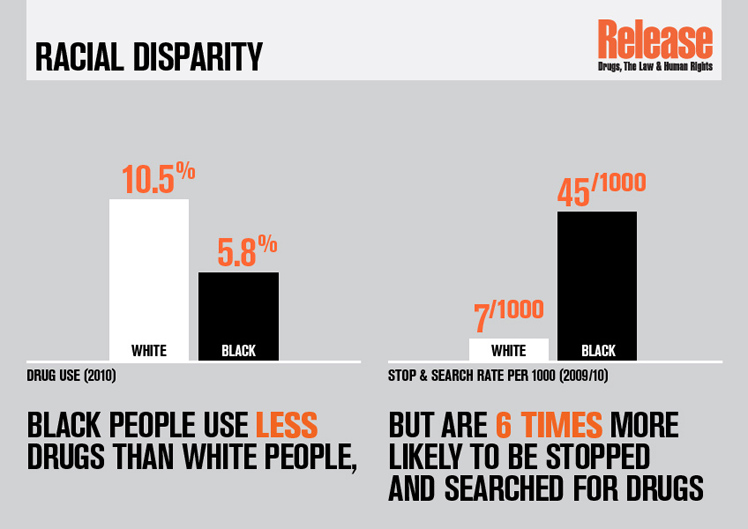A new report published by the UK’s Ministry of Justice reveals that white people are considerably less likely to face arrest or imprisonment for drug offences than people from black, Asian, or other minority ethnic groups. In addition, the report fails to account for a major factor fuelling racial injustice in the justice system: stop and search.
The report – Black, Asian and Minority Ethnic disproportionality in the Criminal Justice System in England and Wales – is part of a review on race and the British criminal justice system, led by MP David Lammy.
The report found that, among people within the criminal justice system, men of black, Asian, mixed, or “other” ethnicity were all significantly more likely to receive a custodial sentence for a drug offence than white men. Additionally, Black women were considerably more likely to be imprisoned for a drug offence than white women.
The report also found a significant racial disparity in arrest rates; black men are 5.4 times more likely to be arrested for drug offences than white men. Equivalent figures are 1.4 for Asian men, 3.2 for men of mixed ethnicity, and 1.66 for men of “other” ethnicity.
Although racial disparities exist in relation to prosecution for other crimes, they are most pronounced in relation to drug offences. The report, which investigated data relating to various crimes – including violent and sexual offences – found that drug offences “was the only offence group where custodial sentencing was consistently more likely for all [black and other ethnic minority] men relative to the white group, and for black women”.

(More information on this infographic here)
Lammy’s failure to include stop and searches as a subject of investigation in his review, though, has led to the painting of an incomplete picture of race and the criminal justice system in the UK. Perhaps more importantly, as Lammy’s report does not even mention stop and search, it is ignoring the huge influence that drug policy has on police-community relations.
In a submission to Lammy's review, Release – the national centre of expertise on drugs and drug laws – detailed how black people and other ethnic minorities are disproportionately targeted in drugs stop and search incidents by police.
“In 2009/10, black people were 5 times more likely to be searched than their white counterparts but when looking specifically at drug searches that figure jumped to 6.3 times”, their submission reads. “Disproportionality existed across other [black and other ethnic minority] groups with Asians being 2.5 times more likely to be searched for drugs and mixed twice as likely.”
The majority of such searches, which significantly contribute to the criminalisation of ethnic minorities, “were for low-level street possession,” according to the police watchdog, Her Majesty’s Inspectorate of Constabulary.
This is despite white people being considerably more likely to have used an illegal drug in the past year than people who are black, Asian, or of an "other" race, according to the government's own statistics.

(More information on this infographic here)
In her first statement as Prime Minister, Theresa May acknowledged that “if you’re black, you’re treated more harshly by the criminal justice system than if you’re white”, yet she has consistently refused to reform the drug laws that contribute to this injustice.
This harshness is particularly evident when the police’s use of cautions is considered. In a segment of Release’s submission that Lammy’s report seems to have ignored, staggering data indicates the dichotomy in the manner by which police treat white and black people for cocaine possession.
In London in 2009/10, 78 per cent of black people found to be possessing cocaine were charged, while 22 per cent received a caution. Conversely, only 44 per cent of white people were charged with an offence. Although both cautions and convictions lead to a criminal record, the latter can have a more profound impact on the individual due to the stress of having to go to court and the risk of a custodial sentence.

(More information on this infographic here)
The government could reduce the number of ethnic minorities being criminalised for non-violent offences by decriminalising drug possession. The continued criminalisation of drug possession is increasing black and other ethnic minority people’s negative encounters with police, thereby worsening community relations. It leads to the marginalisation and incarceration of individuals who have posed no threat to society, and the stigma discourages people who use drugs problematically from seeking medical help.
Lammy’s findings highlight systemic racism in the British judicial system that cannot be simply legislated against, but policymakers can reduce the impact of the racism by reforming the drug laws that fuel discrimination.


